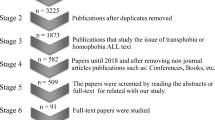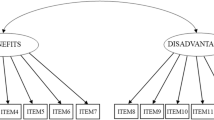Abstract
The purpose of the study was to examine the differences in perceptions of motivation to lead, mental health, and job satisfaction of male and female police constables. Police constables (N = 203, male = 144, female = 59) were surveyed at four districts (Varanasi, Mirzapur, Allahabad and Lucknow) in the state of Uttar Pradesh, Republic of India. Participants’ responses were obtained on questionnaires which measured demographic characteristics, motivation to lead (Dubrin, 1998), psychological well-being, psychological distress (Heubeck & Neill Psychological Reports, 87:431–440, 2000), and job satisfaction (Dantzker’s Journal of Crime and Justice 16:171–181, 1993). Results of t test analysis indicated that job experience, salary, education, motivation to lead, and psychological well-being were significantly different among the male and female police constables. Motivation to lead was a significantly positive correlate of job satisfaction among male participants only while psychological well-being was significantly, positively correlated with job satisfaction of both male and female participants. Psychological well-being also exercised partial mediator effects on the positive relationship between “motivation to lead” and job satisfaction in male police constables only. However, psychological distress was negatively correlated with job satisfaction of male police constables. The findings have significant implications for increasing job satisfaction in the police department. Findings indicate that the government should concentrate on removing anomalies in the job conditions of the female police constables so as to promote psychological well-being. Simultaneously, the police department should also pay attention to conditions which can increase motivation to lead among its female police constables.

Similar content being viewed by others
References
Alexander DA, Walker LG (1994) A study of methods used by Scottish police officers to cope with work-induced stress. Stress Medicine 10(2):131–138
Alexander JA, Liechtenstein RO, Hellmann E (1998) A causal model of voluntary turnover among nursing personnel in long term psychiatric setting. Res Nurs Health 21(5):415–427
Aragon, R. (1993). Positive organizational culture. FBI Law Enforcement Bulletin, 62, (12).
Baron RM, Kenny DA (1986) The moderator-mediator variable distinction in social psychological research: conceptual, strategic and statistical considerations. Journal of Personality & Social Psychology 51:1173–1182
Dantzker ML (1993) Designing a measure of job satisfaction for policing: a research note. J Crime Justice 16(2):171–181
Davey JD, Obst PL, Sheehan MC (2001) Demographic and workplace characteristics which add to the prediction of stress and job satisfaction within the police workplace. Journal of police and Criminal Psychology 16(1):29–39
Densten IL (2003) Senior police leadership: does rank matter? Policing: An International Journal of Police Strategies & Management. 26(3):400–418
DuBrin AJ (1998) Leadership: research findings, practice and skills, 2nd edn. Houghton Mifflin Co., Boston, pp 10–11
Ellickson M, Logsdon K (2001) Determinants of job satisfaction of municipal government employees. State Local Government Review 33(3):173–184
Featherstone R (2008) “Psychologically absent”?: New Zealand police discontent. Queensland Police Union Journal 8:24–25
Folkman S, Moskowitz JT (2004) Coping: pitfalls and promise. Annu Rev Psychol 55:745–774
Gomez-Hernandez R, Max JE, Kosier T, Paradiso S, Robinson RG (1997) Social impairment and depression after traumatic brain injury. Arch Phys Med Rehabil 78(12):132–136
Hassett-Walker C, Boyle DJ (2007) Conducting criminological research in a hospital: the results of two exploratory studies and implications for prevention. Justice Research and policy 9(1):75–94
Haves SC, Wilson KG, Gifford EV, Follette V, Strosahl K (1996) Experimental avoidance and behavioural disorders: a functional dimensional approach to diagnosis and treatment. J Consult Clin Psychol 64(6):1152–1168
Herzberg F, Mausner B, Snyderman B (1959) The motivation to work, 2nd edn. John Wiley & Sons, New York
Heubeck B, Neill JT (2000) Confirmatory factor analysis and reliability of the mental health inventory for Australian adolescents. Psychol Rep 87:431–440
Johnsen BH, Espevik R, Saus ER, Sanden S, Olsen OK, Hystad SW (2017) Hardiness as a moderator and motivation for operational duties as mediator: the relation between operational self-efficacy, performance satisfaction, and perceived strain in a simulated police training scenario. Journal of police and Criminal Psychology. doi:10.1007/s11896-017-9225-1
Kaur R, Chodagiri VK, Reddi NK (2013) A psychological study of stress, personality and coping in police personnel. Indian Journal of Psychological Medicine 35(2):141–147
Kula S (2016) Occupational stress, supervisor support, job satisfaction, and work-related burnout: perceptions of Turkish National Police (TNP) members. Police Pract Res. doi:10.1080/15614263.2016.1250630
Kumar V, Kamalanabhan TJ (2014) Sources of stress among police officials: a qualitative investigation. Indore Management Journal 6(1):79–89
Leonard R, Alison L (1999) Critical incident stress debriefing and its effects on coping strategies and anger in a sample of Australian police officers involved in shooting incidents. Work Stress 13:144–161
Locke EA (1976) The nature and causes of job satisfaction. In: Dunnette MD (ed) Handbook of industrial and organizational psychology. Rand McNally, Chicago, pp 1297–1349
Maslow AH (1970) Motivation and personality (p.28). Harper & Row, New York
Maurya MK, Agarwal M (2013a) Relationship between interpersonal trust dimensions, mental health status and job satisfaction of PAC, civil police and traffic police. Indian Journal of Health and Wellbeing 4(4):785–789
Maurya MK, Agarwal M (2013b) ‘Motivation to lead’ among male and female police constables. Journal of Psychosocial Research 8(1):13–21
Maurya MK, Agarwal M (2014) Relationship between perceived workplace harassment, mental health status and job satisfaction of male and female civil pólice constables. Indian Journal of Community Psychology 10(1):162–177
Maurya MK, Agarwal M (2015) Relationship between supportive leadership, mental health status and job satisfaction of male and female civil police constables. Journal of the Indian Academy of Applied Psychology 41(3):103–111
McCarty WP, Zhao JS, Gerland BE (2007) Occupational stress and burnout between male and female police officer. Policing: An International Journal of Police Strategies and Management 30(4):672–691
McClelland DC (1961) The achieving society. Van Nostrand, Princeton
McEven BS (1998) Protective and damaging effects of stress mediators. N Engl J Med 338(3):171–179
McGregor D (1960) The human side of the enterprise. McGraw-Hill, Inc., New York
Mineka S, Zinberg R (2006) A contemporary learning theory perspective on the etiology of anxiety, disorders: it’s not what you thought it was. Am Psychol 61:10–26
Mohanraj C, Natesn MR (2015) Stress and job satisfaction: an empirical study among the women police constables in Coimbatore, Tamilnadu, India. International Journal of Interdisciplinary and Multidisciplinary Studies 2(5):153–157
Moser K (1997) Commitment in organizations. Psychologies 41(4):160–170
Ouchi WG (1981) The theory Z. Avon Books, New York
Padyab M, Erlanson SB, Brulin C (2016) Burnout, coping, stress of conscience and psychosocial work environment among patrolling police officers. Journal of police and Criminal Psychology 31(4):229–327
Parmar VK, Dhingra A (2016) A study of occupational stress and job satisfaction of police personnel of Gujarat state. The International Journal of Indian Psychology 3(3):33–39
Parsekar SS, Singh MM, Bhumika TV (2015) Occupation-related psychological distress among police constables of Udupitaluk, Karnataka: a cross-sectional study. Indian Journal of Occupational and Environmental Medicine 19(2):80–83
Pasillas RM, Follette VM, Perumesn-Chaney SE (2006) Occupational stress and psychological functioning in law enforcement officers. Journal of Police and Criminal psychology 21(1):41–53
Patel, S. (2006). Women in Ahmadabad police have high stress level. Virtual gateway of Gujrat Sat 22 March, 2006 Gujarat Global News Network, Ahmadabad
Pearson-Goff M, Herrington V (2014) Police leadership: a systematic review of the literature. Policing 8(1):14–26
Pienaar J, Rothmann S, Van De Vijver FJR (2007) Occupational stress, personality traits, coping strategies, and suicide ideation in the south African police service. Criminal Justice Behaviour 34:246–258
Reddin WJ (1970) Managerial effectiveness. (p.189–190). McGraw-Hill Book Company, New York
Rowe M (2006) Following the leader: front-line narratives on police leadership. Policing: An International Journal of Police Strategies & Management 29(4):757–767
Sandier, Bennett G, Mintz E (1974) Police organizations: their changing internal and external relationships. J Police Sci Adm 2:458–463
Scarpello V, Campbell JP (1983) Job satisfaction: are all the parts there? Pers Psychol 36:577–600
Shenbaham K, Divyasa S (2016) A study on job satisfaction among women police. International Journal of Applied Research 2(2):336–338
Singh AP (2016) Coping with work stress in police employees. Journal of Police and Criminal Psychology. doi:10.1007/s11896-016-9215-8
Singh R, Nayak JK (2015) Mediating role of stress between work-family conflict and job satisfaction among the police officials: moderating role of social support. Policing: An International Journal of Police Strategies & Management 38(4):738–753
Smith PC, Kendall LM, Hulin CL (1969) The measurement of satisfaction in work and retirement. Rand McNally, Chicago
Sobel ME (1982) Asymptotic confidence intervals for indirect effects in structural equations models. In: Leinhart S (ed) Sociological methodology. Jossey-Bass, San Francisco, pp 290–312
Stinchomb, J. B. (1986). Correctional officer stress: is training missing the target? Correctional monograph: issues in correctional training and casework, 19–23
Stinchomb JB (2004) Searching for stress in all the wrong places: combating chronic organizational stressors in policing. Police Pract Res 5(3):259–277
Tyagi A, Dhar RL (2014) Factors affecting health of the police officials: mediating role of job stress. Policing: An International Journal of Police Strategies & Management 37(3):649–664
Violanti JM, Aron F (1993) Sources of police stressors, job attitudes and psychological distress. Psychol Rep 72:899–904
Whisenand P, Rush (1998) Supervising police personnel: the fifteen responsibilities. Prentice Hall, New Jersey
World Health Organization (2001) Strengthening mental health promotion. World Health (Fact sheet no. 220), Geneva
Wright B, Davis B (2003) Job satisfaction in the public sector: the role of the work environment. American Review of Public Administration 33(1):70–90
Author information
Authors and Affiliations
Corresponding author
Rights and permissions
About this article
Cite this article
Maurya, M.K., Agarwal, M. Relationship Between Motivation to Lead, Mental Health Status, and Job Satisfaction of Male and Female Civil Police Constables. J Police Crim Psych 33, 9–20 (2018). https://doi.org/10.1007/s11896-017-9230-4
Published:
Issue Date:
DOI: https://doi.org/10.1007/s11896-017-9230-4




